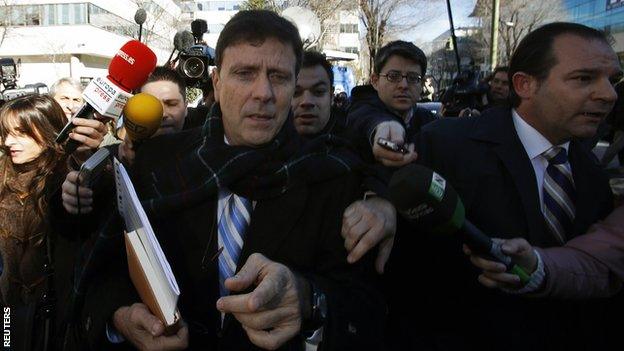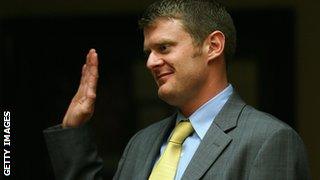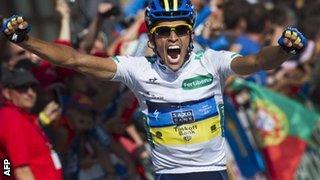Spain's Operacion Puerto to inflict more embarrassment on cycling
- Published

Last week, Team Sky boss Sir Dave Brailsford said he thought cycling knew enough now about doping to come up with a decent plan to tackle it.
"If 25 guys tell you how they robbed a bank, what new information are you going to learn from the 26th, 27th… it's a diminishing return," he suggested.
It was a mildly controversial thing for him to say at the time, but events this week have made his stance even more isolated.
The International Cycling Union's (UCI) decision to scrap the independent commission it set up to look into the Lance Armstrong scandal will come as little surprise to some. Yet its alternative plan for a "truth and reconciliation commission" proves there are still people at the top in cycling who can tell which way the wind is blowing.
There is, however, one corner of the cycling world that seems to be as uneasy about "T&R" as Brailsford is. That is Spain, which is coincidentally where Sir Dave made his remarks.
His problem with handing out amnesties for dopers in return for testimony is that it lets them off the hook too easily. He argues that cycling should just get on with making sure the sport never loses its way so badly again.
Spain's issue with truth and reconciliation is… well, it's complicated.
For proof of this look no further than the trial that has started this week in Madrid into a doping conspiracy that was uncovered nearly seven years ago, when "Operacion Puerto" shut down the blood-manipulating activities of Dr Eufemiano Fuentes and friends., external
Lance Armstrong admits doping to win cycling titles
These activities certainly match Armstrong's in terms of their scale. It is their professionalism, sophistication and success that is up for debate.
But first, some background.
In 2004, a rider called Jesus Manzano told Spanish newspaper AS about the blood-doping secrets of his former team Kelme., external
Among other shocking accusations, he claimed his dramatic exit from the 2003 Tour de France - airlifted off a mountain with near fatal dehydration - was the result of his team doctor giving him a blood-boosting drug intended for dogs.
Fuentes, having made quite a reputation for himself in athletics and at Spain's most successful cycling team ONCE, was Kelme's medicine man.
The team dismissed Manzano's story as the fabrication of a bitter man, pointing out that he had been sacked after he was caught with a woman in his hotel room during the 2003 Tour of Spain.
But was he telling the truth?
Enough people at the anti-drug trafficking arm of Spain's Guardia Civil thought so and started making polite inquiries about the pharmaceutical habits of the country's best cyclists.
When, in 2005, Armstrong's former team-mate Roberto Heras tested positive for the drug du jour EPO, external on his way to a record fourth win at the Vuelta, those inquiries were bolstered by wire taps.
Heras was riding for Liberty Seguros, the old ONCE team's new sponsor, but Fuentes was his "personal physician". It would soon become apparent that Heras was not the doctor's only private patient.
By May 2006, those listening in on the wire had heard enough and arrested Fuentes and four associates, including his sister. Raids on properties owned by Fuentes uncovered almost 200 bags of frozen blood, 40 bags of plasma and a trove of steroids, growth hormone and masking agents.
Most intriguingly, police also found calendars and documents marked with code names.

American cyclist Floyd Landis was stripped of his 2006 Tour de France title after failing a drugs test.
Matching a rider with the code would become a popular parlour game amongst cycling fans for months to come. For many of those fans, "guess the cheat" was better than watching the racing, particularly when Spanish investigators published a report two days before the start of the 2006 Tour de France that included the names of 56 cyclists.
Among them was a young Alberto Contador, Armstrong whistle-blower Tyler Hamilton and Lance's favourite victim Jan Ullrich.
And then? Not much really.
The 2006 Tour would finish as it started, in shame, with American Floyd Landis, external being stripped of victory for failing a drugs test. But by that point the vast majority of those named in the Puerto case had already been told they would be facing no further action, criminal or sporting.
With doping not a crime in Spain until a new law made it so in November 2006, the former was no surprise, but the fact so many were able to get away with cheating speaks volumes of an ambivalence towards doping that lingers in Spanish cycling.
To this date, only six of the 56 have been given bans for their involvement with Fuentes - and one of those, Giampaolo Caruso, would get his ban overturned on appeal - and none of those had anything to do with the Spanish cycling authorities.
You can see why Armstrong liked living in Girona so much.
So, given this Spanish reluctance to pry too deeply into old doping cases - and the fact that Fuentes and his four co-defendants face "public health" charges that have very little to do with actual sport - why the fuss about Operacion Puerto?
The short answer to that question is Balco.
Balco is shorthand for the biggest doping scandal in US sports history prior to Armstrong's.
For those who have lost count, the Bay Area Laboratory Co-Operative was the sports nutrition company that happened to have a sideline in supplying cutting-edge doping products to some of the world's leading track and field stars as well as a number of big names from American football, baseball and boxing.
Operacion Puerto has been Europe's Balco-in-waiting ever since the name of Fuentes first hit the headlines.
That's because of his occasional - but potentially explosive - comments about his client list beyond cycling, not to mention the claims of riders like Manzano and Jorg Jaksche, who have spoken about their doctor's "other patients".
There is little doubt that Fuentes developed his expertise in what could euphemistically be called "sports medicine" when he was working with Spanish athletes in the 1980s. His future wife, Cristina Perez, was a hurdler on the national team but failed a drugs test shortly after the 1988 Olympics.
But doping in athletics - like cycling - is hardly news. Proof of doping in Spanish football or tennis, however, could plunge the country into darkness.
In the aftermath of his arrest in 2006, Fuentes said he had 200 clients in professional sport, which leaves almost 150 unaccounted for. There is also the small matter of 100 bags of unclaimed frozen blood.

Alberto Contador returned to cycling in August 2012, after serving a two-year ban
Yet the prospect of the 57-year-old doctor providing the names of those clients during this trial seems unlikely. The judge has already limited proceedings to the cycling cases, allowing Fuentes to admit on Tuesday that he also treated "tennis players, athletes, footballers and a boxer" and just leave it at that.
When asked by Le Monde journalist Stephane Mandard on Monday if he was going to "tell all", Fuentes said: "I don't intend to name any of my clients. For me, that's the past."
Le Monde, as it happens, was forced to pay damages to Barcelona in 2011 for a story it published in 2006 about the club's alleged links with Fuentes. The same article also mentioned Real Betis, Real Madrid and Valencia. All four clubs denied any wrongdoing.
Spanish tennis superstar Rafael Nadal was also asked about a possible connection to Puerto in a press conference at Wimbledon in 2006. It was one of the few times anybody can remember him scowling, his rejection of any link was made very clear.
"I do not want to be a hero or a martyr. This is a huge hypocrisy," Fuentes told Mandard. There are many of his compatriots who will be delighted he feels that way.
Cycling fans, on the other hand, are going to have to endure another two months of this, as the likes of Contador and 2005 Tour runner-up Ivan Basso are called in to say as little as they possibly can about their dealings with the dodgy doctor.
It will all be very seedy and embarrassing, particularly for Contador, who only returned from a two-year ban in August.
Spain's tarnished reputation in this area is also unlikely to get much of a polishing, although getting this trial on after so many judicial roadblocks is a victory of sorts.
So as adverts for truth and reconciliation go, the Operacion Puerto trial looks set to be a disappointment. Hazy memories and the distinct possibility of a mistrial look more likely, which would ensure Fuentes keeping his secrets and Spain its heroes.
- Published29 January 2013
- Attribution
- Published29 January 2013
- Attribution
- Published28 January 2013
- Published27 January 2013